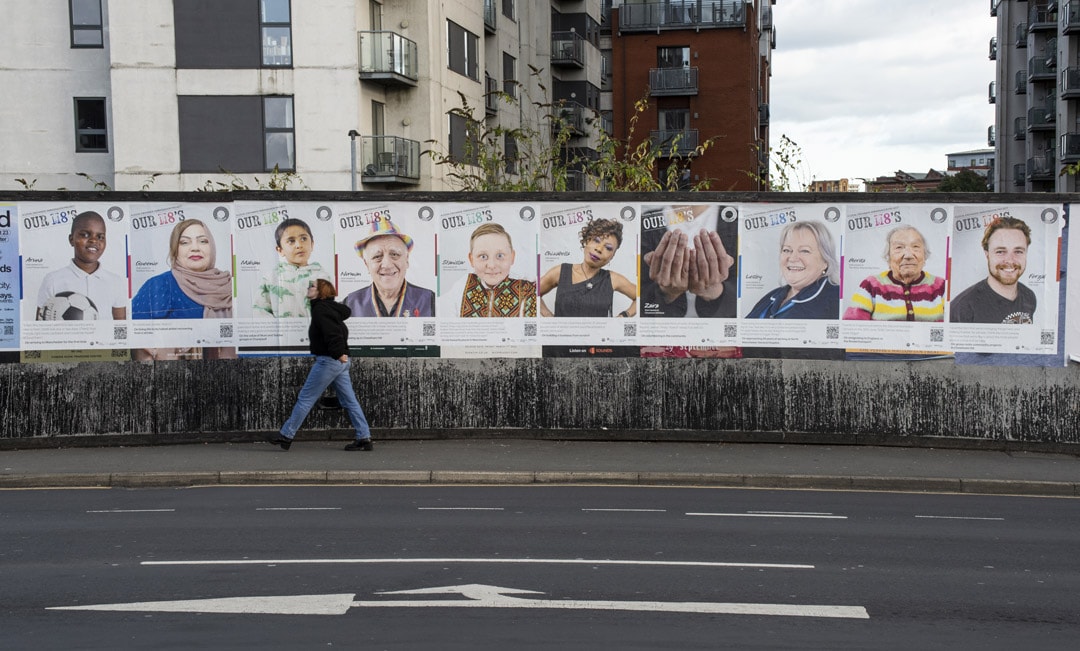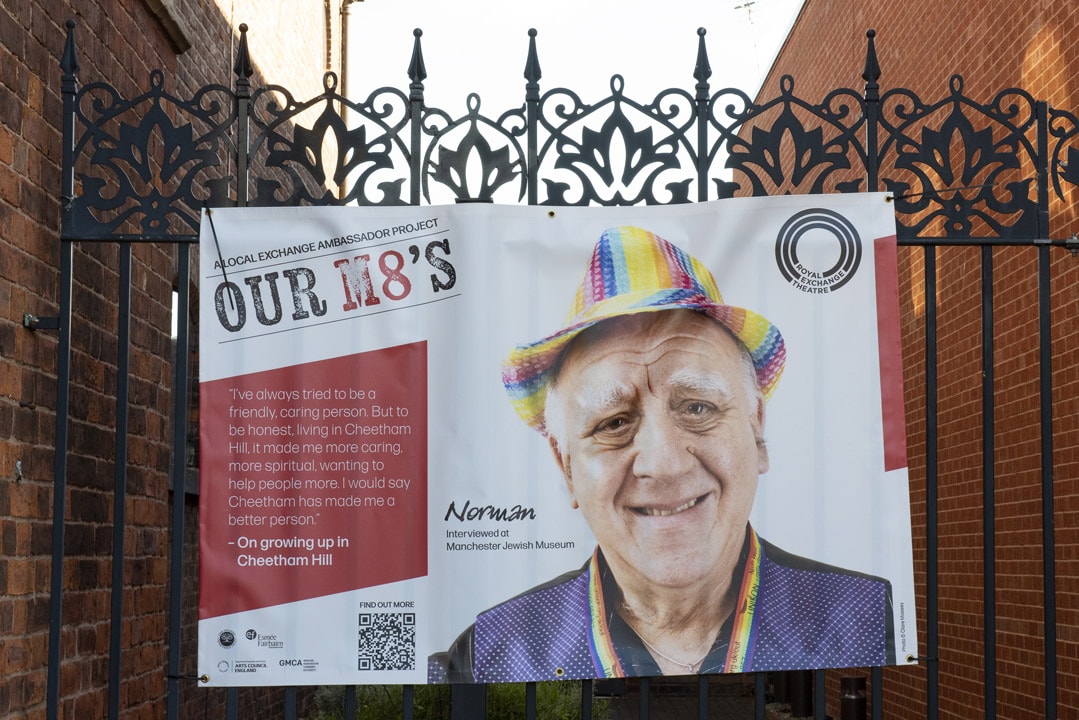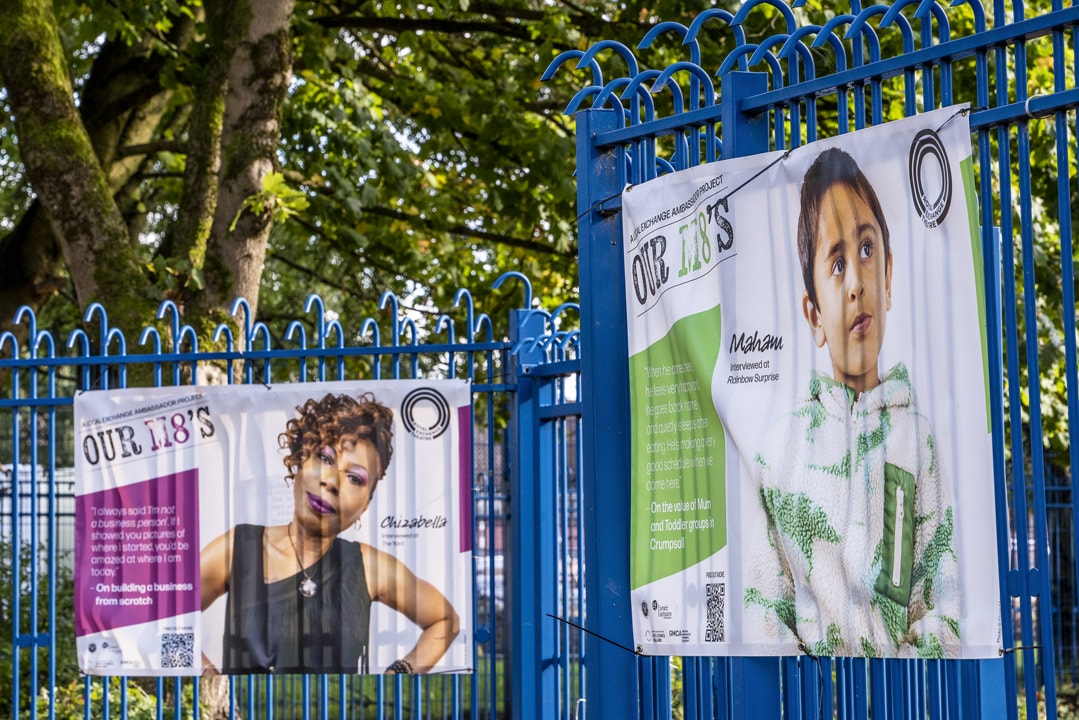TW: the contents of this interview includes references to conversion therapy and death.
Norman was “born in 1950. As a child, there wasn’t a lot of money about but everybody was the same in the area. I was brought up on the notorious Haywood Street! I’ve always tried to be a friendly, caring person. But to be honest, living in Cheetham Hill made me more caring, more spiritual, [made me want] to help people more ‘cause there was a lot of poor people, a lot of children, a lot of poverty. There were times I didn’t have anything, but I would say Cheetham has made me a better person.”
Norman explained how he got into nursing: “From the age of 11 to 17, I wanted to change gender, I wanted to transition. I was in the hospital Gaskell House. I was given electroconvulsive therapy, which I didn’t know was given, ‘cause you were “mentally ill.” Cause wanting to change sex [meant] you were gay, you were mentally ill. So, we had a course of electroconvulsive therapy and aversion therapy. I was determined to have a sex change but it didn’t happen and I thought I’ve got to get on with life. So, when I was 18½, I got a job as a porter on the private patients ward at Manchester Royal Infirmary. I worked there for about six months, then North Manchester General were advertising for Orderlies. It was called Crumpsall Hospital in them days. And I got a job as an Orderly on the orthopaedic [ward] because that was much nearer home – we lived on Woodlands Road then. It was very hard work on the orthopaedic ward – there were tractions, you had to clean all the bars of the beds, it was really hard work, but I loved it.
“Then, some of the nurses said to me: “Norman, why don’t you do your SEN?” (State Enrolled Nurse) And I said, I don’t think I’m clever enough! And they said: “Norman, we’re telling you to do your SEN.” So, after working as an Orderly for 20 months, I’d done my SEN, and that basically is how I got into nursing. I was a nurse from 1970-1981.”
Norman stopped working after becoming ill: “I worked on the male geriatric ward. And quite honestly, before I got married, I was working nights and I absolutely loved nights. I was on [the] Genito-Urinary ward most nights, B Block, at old Manchester General. But when I got married, obviously, you know, I couldn’t work nights. I would have done! I would have, but my wife says: “oh no, no!”
“So there was a job going on E3 for an SEN. And, if I’m totally honest, I got into a real rut. I worked on that ward for about 9 or 10 years and it was hard – I loved the old people I really, really adored [them] – they all had the stories, they’d all been somebody in the day.
“Then out of all things, because the mortality rate was high, I got scared of dead bodies. And I was very ill for quite a few years; I had a breakdown in 1984. That’s when I left nursing.”
After he left nursing, he started to find his way into charity work. “From a youngster, I could always read tea leaves! When I left nursing there was a child in Prestwich and there was an appeal going out for him. People would come to our house [and] I would only charge £1, read the tea leaves… I raised £268 for that kiddie. So, because people started filming me up, I started raising money for Save the Children, Christie’s Hospital, lots of different charities and I’ve raised a few thousand pounds.”
Norman went on to share how he discovered he was bisexual: “When I was in Gaskell House and I had the electroconvulsive therapy and the aversion therapy. Six months later I was back in there because I had a relapse. The first time I was in, I used to always sit with the women, I always sat with the women around a big table doing therapy. But the second time I was in, I decided to sit with the men and try and be more like the men. I didn’t get any support after that, but I could have done with a lot more support. And really and truly, if they would have gone ahead with the transition, my life would have been a lot happier than it has been… I didn’t know ‘til I was 34 I was bisexual. I thought perhaps I was gay, then I liked girls, so I thought I must be straight. Then I married my wife – we fell in love and I married my wife and we were really, really happy. But I realised a few years later, you know, I was still attracted to men.
“It was very difficult ‘coz I acted straight, I was straight-acting for most of my life. I was putting this face on. If I was with the other lads I’d stand with me hands in me pockets, you know, they swore, I’d swear, you know?
‘I’d been married a few years and I realised I was still attracted to men. I thought well, how do I tell [my wife]? I can’t tell her. So, it was my secret. Then in 1984, I did have a breakdown because of this death problem that I had. And I was in Prestwich Hospital for three weeks… I was sat on the wall one afternoon and I thought: “I like women and I like men, I must be bisexual!”
“It took me 10 years to tell [my wife] I was bisexual… We’d had a bit of a disagreement and I had to walk around. It was pouring down with rain. I got back and I said: “I’ve got to tell you something.” And she says “what?” and I said: “I like men as well as women.”…She was upset, but not as bad as I thought.
“We spoke about it for a few days and I did go for counselling… She said to me“I did know,” she said, “I did know. I’ve never said anything but I did.” I said, “I’m glad you know.”
“[After she died], there was a mountain inside of me, it was ready to go into a volcano. I was actually praying for a way to come out. [I attended] a talk at the People’s History Museum [by the LGBT Foundation] and about the work that they do. At the end of the talk, they were looking for volunteers over 60 to make tapes, cassette tapes [about what life was like in the 1950s/60s for gay people]… “Was there any places? How did you cope?” A lot of people couldn’t talk about it in them days… When I’m long gone, young people’ll hear them tapes, and hopefully they will help people. They’re in the archives now in the central library.”
Norman reflected on his greatest loves: “[My wife] was Jewish, yeah. When I first met her, I thought “God she looks like a doll!”. She had gorgeous black hair. She had a lovely dark black dress on with blue on it. And we started going out together and I fell in love with her.
“There’s a synagogue at the bottom of Meade Hill Road… It was called the United Synagogue. But I think they’ve changed the name – that’s where we got married. It was five o’clock, on August 18th, 1974.
“Marilyn and I, we absolutely loved each other, we adored each other. When she died, part of me died… But, then Tony came into my life 15 months ago. I’d been going to “Out In The City Group” for a couple of years. And when he told me he liked me, I said I’d never had a relationship with a man – I’m not interested! But, he went to Bratislava to his sister’s, and he text me everyday and phoned me on Christmas morning… I found I was sat at home to see if he’d text me, so when he come back I thought, yes, I’m going to give it a go… I could not live without him now.
“Later on, when he comes in, I’ll be happy you know, I’ll have something cooked. I do all the cooking, he does all the washing up, you know. We’re always telling each other we love each other.”
Norman is passionate about the way women are treated in today’s society and his relationship with Judaism: “Women should be treated with respect – that’s why I like the Reform Synagogue because women are involved in the services. The lady Rabbis walked in the last Pride procession last year; I walked with them. We’ve got a big LGBT people, two men or two women who got married in the Reform Judaism – women are treated with respect.”
So, what’s next for Norman? “I’m going to be a Rainbow Buddy, [for] people who are trying to come out. It might be younger people, older people. They will come into the LGBT Foundation in Sackville Street and I will talk to them… They can tell me whatever they like. I’m just going to be a listener. And just [be] somebody for them to chat to. There’s a lot of isolated people out there… I want to get as far as I can… I like to be a voice as well for people who can’t talk for themselves sometimes…
“I think a 20 year old me would be pleased as punch with what I’m doing.”















